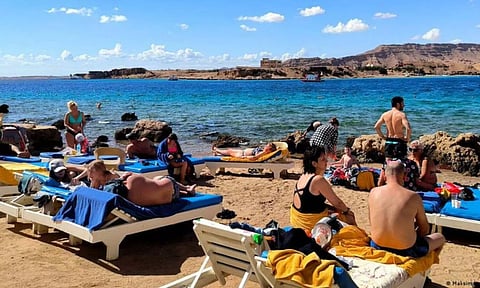

• C SCHAER, M FARHAN
EGYPT: It has been described as a “turning point” in the worst economic crisis Egypt has dealt with in decades. The country is hugely indebted and suffering from a shortage of foreign currency, which has led to damaging inflation and rising prices that many ordinary Egyptians are finding hard to handle. But, last week, Egyptian leaders announced that the United Arab Emirates would be investing $35 billion directly into the Egyptian economy, mostly via a construction project at Ras al-Hikma, a Mediterranean peninsula near the city of Alexandria. It is thought to be the biggest such investment in Egypt’s history.
The first tranche of money has already been deposited. Much of this came from cash the UAE already held in Egypt’s central bank. The rest is expected to arrive within two months, according to Egyptian officials. The impact of the deal and the release of the first tranche of funds from the central bank had an impact almost immediately, improving Egypt’s financial position in various ways.
The deal will also make it easier for Egypt to fulfill conditions set by the IMF. Egypt and the IMF are in the final stages of negotiating another multi-billion dollar bailout, likely worth over $10 billion (9.2 billion euros), to stabilize the Egyptian economy. The IMF’s conditions for a deal involve devaluing the Egyptian pound to bring it into line with the real exchange rate, as opposed to that set by the government, and to further privatize state assets. Basically, this means taking them away from the all-powerful Egyptian military and selling them to private investors. And there are rumors of another similar deal coming soon. These suggest Saudi Arabia will invest a further $15 billion into a Red Sea tourist destination, Ras Gamila.
Not everyone has been so enthusiastic about the deal. This investment project is just part of a pattern, said Hossam el-Hamalawy, an Egyptian researcher and activist now living in Germany who writes a regular newsletter on Egyptian politics.
“[Egyptian President Abdel Fattah] el-Sissi has been borrowing left, right and center for years, to complete mega-projects that satisfy his irrational economic decisions,” said el-Hamalawy. “And he is always counting on the fact that he will get bailed out by regional or international powers because of the notorious saying, ‘Egypt is too big to fail’.” The Egyptian government “has squandered past injections of cash with extraordinary speed,” added Timothy Kaldas, deputy director of the Washington-based Tahrir Institute for Middle East Policy. “An injection of cash buys Egypt temporary investor confidence. But what is key for long-term confidence are serious reforms and a clear sign from the country’s leaders that they are using this opportunity to change course [...] it will take more than a windfall and a fancy new beach resort to rebuild [that],” he told DW.
El-Hamalawy and others have also pointed to protests by Ras al-Hikma residents who are threatened with displacement once construction starts. One of the UAE’s sovereign investment funds, ADQ, will be in charge of this project and has said work will begin in early 2025. Environmental standards are also a concern in this coastal area, according to critics of the plan.
At the moment, the idea that Egypt is “too big to fail” is particularly compelling. The nation is under political and economic pressure due to the ongoing conflict in Gaza. Fighting there has meant important income earners for Egypt, like tourism and shipping through the Suez Canal, have been throttled.